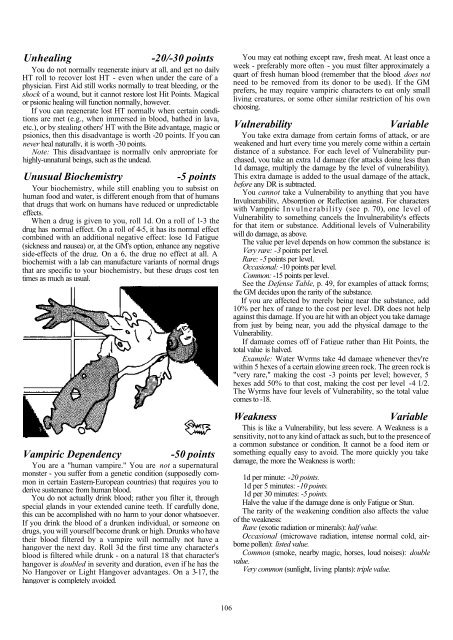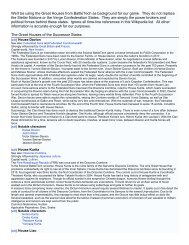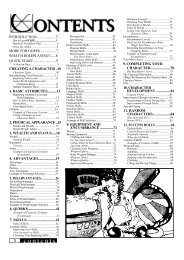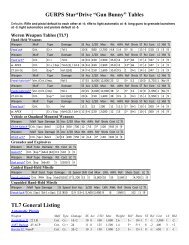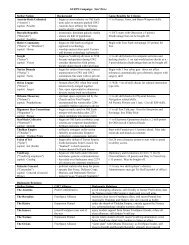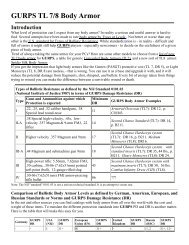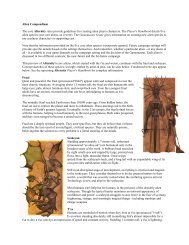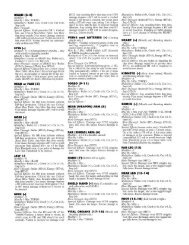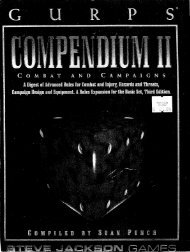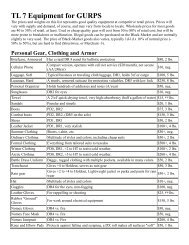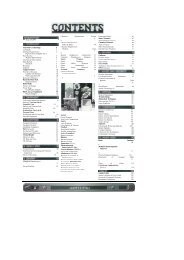GURPS - Compendium 1..
GURPS - Compendium 1..
GURPS - Compendium 1..
You also want an ePaper? Increase the reach of your titles
YUMPU automatically turns print PDFs into web optimized ePapers that Google loves.
Unhealing<br />
-20/-30 points<br />
You do not normally regenerate injury at all, and get no daily<br />
HT roll to recover lost HT - even when under the care of a<br />
physician. First Aid still works normally to treat bleeding, or the<br />
shock of a wound, but it cannot restore lost Hit Points. Magical<br />
or psionic healing will function normally, however.<br />
If you can regenerate lost HT normally when certain conditions<br />
are met (e.g., when immersed in blood, bathed in lava,<br />
etc.), or by stealing others' HT with the Bite advantage, magic or<br />
psionics, then this disadvantage is worth -20 points. If you can<br />
never heal naturally, it is worth -30 points.<br />
Note: This disadvantage is normally only appropriate for<br />
highly-unnatural beings, such as the undead.<br />
Unusual Biochemistry<br />
-5 points<br />
Your biochemistry, while still enabling you to subsist on<br />
human food and water, is different enough from that of humans<br />
that drugs that work on humans have reduced or unpredictable<br />
effects.<br />
When a drug is given to you, roll 1d. On a roll of 1-3 the<br />
drug has normal effect. On a roll of 4-5, it has its normal effect<br />
combined with an additional negative effect: lose 1d Fatigue<br />
(sickness and nausea) or, at the GM's option, enhance any negative<br />
side-effects of the drug. On a 6, the drug no effect at all. A<br />
biochemist with a lab can manufacture variants of normal drugs<br />
that are specific to your biochemistry, but these drugs cost ten<br />
times as much as usual.<br />
Vampiric Dependency<br />
-50 points<br />
You are a "human vampire." You are not a supernatural<br />
monster - you suffer from a genetic condition (supposedly common<br />
in certain Eastern-European countries) that requires you to<br />
derive sustenance from human blood.<br />
You do not actually drink blood; rather you filter it, through<br />
special glands in your extended canine teeth. If carefully done,<br />
this can be accomplished with no harm to your donor whatsoever.<br />
If you drink the blood of a drunken individual, or someone on<br />
drugs, you will yourself become drunk or high. Drunks who have<br />
their blood filtered by a vampire will normally not have a<br />
hangover the next day. Roll 3d the first time any character's<br />
blood is filtered while drunk - on a natural 18 that character's<br />
hangover is doubled in severity and duration, even if he has the<br />
No Hangover or Light Hangover advantages. On a 3-17, the<br />
hangover is completely avoided.<br />
You may eat nothing except raw, fresh meat. At least once a<br />
week - preferably more often - you must filter approximately a<br />
quart of fresh human blood (remember that the blood does not<br />
need to be removed from its donor to be used). If the GM<br />
prefers, he may require vampiric characters to eat only small<br />
living creatures, or some other similar restriction of his own<br />
choosing.<br />
Vulnerability<br />
Variable<br />
You take extra damage from certain forms of attack, or are<br />
weakened and hurt every time you merely come within a certain<br />
distance of a substance. For each level of Vulnerability purchased,<br />
you take an extra 1d damage (for attacks doing less than<br />
1d damage, multiply the damage by the level of vulnerability).<br />
This extra damage is added to the usual damage of the attack,<br />
before any DR is subtracted.<br />
You cannot take a Vulnerability to anything that you have<br />
Invulnerability, Absorption or Reflection against. For characters<br />
with Vampiric Invulnerability (see p. 70), one level of<br />
Vulnerability to something cancels the Invulnerability's effects<br />
for that item or substance. Additional levels of Vulnerability<br />
will do damage, as above.<br />
The value per level depends on how common the substance is:<br />
Very rare: -3 points per level.<br />
Rare: -5 points per level.<br />
Occasional: -10 points per level.<br />
Common: -15 points per level.<br />
See the Defense Table, p. 49, for examples of attack forms;<br />
the GM decides upon the rarity of the substance.<br />
If you are affected by merely being near the substance, add<br />
10% per hex of range to the cost per level. DR does not help<br />
against this damage. If you are hit with an object you take damage<br />
from just by being near, you add the physical damage to the<br />
Vulnerability.<br />
If damage comes off of Fatigue rather than Hit Points, the<br />
total value is halved.<br />
Example: Water Wyrms take 4d damage whenever they're<br />
within 5 hexes of a certain glowing green rock. The green rock is<br />
"very rare," making the cost -3 points per level; however, 5<br />
hexes add 50% to that cost, making the cost per level -4 1/2.<br />
The Wyrms have four levels of Vulnerability, so the total value<br />
comes to -18.<br />
Weakness<br />
Variable<br />
This is like a Vulnerability, but less severe. A Weakness is a<br />
sensitivity, not to any kind of attack as such, but to the presence of<br />
a common substance or condition. It cannot be a food item or<br />
something equally easy to avoid. The more quickly you take<br />
damage, the more the Weakness is worth:<br />
1d per minute: -20 points.<br />
1d per 5 minutes: -10 points.<br />
1d per 30 minutes: -5 points.<br />
Halve the value if the damage done is only Fatigue or Stun.<br />
The rarity of the weakening condition also affects the value<br />
of the weakness:<br />
Rare (exotic radiation or minerals): half value.<br />
Occasional (microwave radiation, intense normal cold, airborne<br />
pollen): listed value.<br />
Common (smoke, nearby magic, horses, loud noises): double<br />
value.<br />
Very common (sunlight, living plants): triple value.<br />
106


